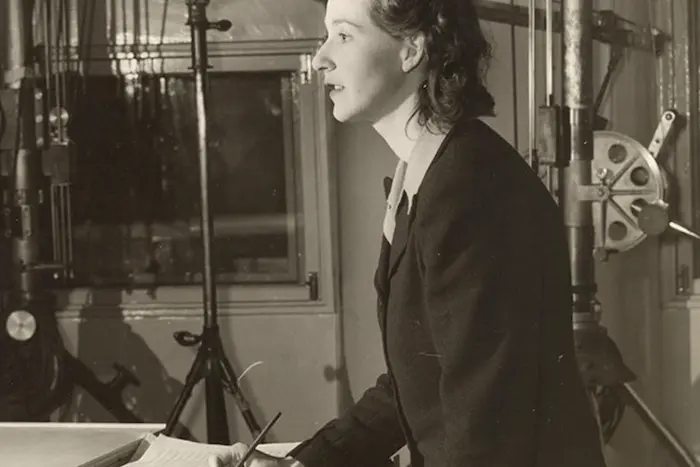Doreen Carwithen, also known as Mary Alwyn, was a British composer who contributed significantly to the world of classical music and film scoring. Despite her considerable talent, Carwithen’s work has often been overshadowed by her male contemporaries, and she remains an underappreciated figure in British music history. This article delves into her life, career, and legacy, highlighting her unique contributions to music and her pioneering role as one of the few female film composers of her time.
I. Early Life and Education
A Musical Family
Doreen Carwithen was born on November 15, 1922, in Haddenham, Buckinghamshire, England. She was raised in a musical family, which greatly influenced her career path. Her mother, an accomplished pianist, provided her early music education. By the age of four, Carwithen was already learning the piano, and she soon progressed to other instruments, including the violin and cello.
Formal Education
Carwithen’s formal music education began at the Royal Academy of Music in London, where she enrolled in 1941. She studied under notable figures such as William Alwyn, a prominent British composer, who would later become her mentor and husband. At the Academy, she excelled in composition, winning several prizes, including the esteemed Charles Lucas Prize for composition.
Compositional Style
Carwithen’s compositional style was marked by her use of lush harmonies, lyrical melodies, and a keen sense of orchestration. Her music was influenced by the pastoral tradition in British music, but she also incorporated elements of modernism, giving her work a distinctive voice.
II. Early Career
Orchestral Works
Carwithen began her professional career as a composer of concert music. One of her earliest works, the “Overture: ODTAA” (One Damn Thing After Another), premiered in 1945 and received positive reviews. This piece showcased her ability to create dynamic and engaging orchestral music, earning her recognition as a promising young composer.
Chamber Music
In addition to orchestral works, Carwithen composed a number of chamber pieces during the early stages of her career. Her “String Quartet No. 1” (1946) and “Piano Trio” (1948) are notable examples of her skill in this genre. These compositions reflect her strong grasp of form and structure, as well as her ability to write for small ensembles with clarity and precision.
Piano Music
Carwithen’s output also includes several works for solo piano. Her “Sonatina for Piano” (1946) is a charming piece that demonstrates her lyrical gift and technical command of the instrument. This work, along with her other piano compositions, contributed to her growing reputation as a versatile composer.
III. Film Music Career
Introduction to Film Scoring
In the late 1940s, Carwithen was introduced to the world of film music, a genre that would become a significant part of her career. Her first major project was the score for the 1947 documentary “This Modern Age,” produced by the Shell Film Unit. The success of this score led to further opportunities in the film industry, and Carwithen quickly established herself as a talented film composer.
Notable Film Scores
Carwithen’s filmography includes scores for several important British films of the 1950s. Among her most notable works are the scores for “Men of Sherwood Forest” (1954), “East Anglian Holiday” (1954), and “Break in the Circle” (1955). These scores display her ability to create music that enhances the narrative and emotional impact of a film, a skill that made her a sought-after composer in the industry.
Challenges and Achievements
As a female composer in a male-dominated industry, Carwithen faced significant challenges. Despite these obstacles, she managed to carve out a successful career in film music. Her work was praised for its craftsmanship and sensitivity to the needs of the films she scored, and she earned the respect of her peers in the industry.
IV. Selected Works by Doreen Carwithen
Concert Music
Overture: ODTAA (1945)
String Quartet No. 1 (1946)
Piano Trio (1948)
Sonatina for Piano (1946)
Bishop Rock (1952)
Film Scores
This Modern Age (1947)
Men of Sherwood Forest (1954)
East Anglian Holiday (1954)
Break in the Circle (1955)
The Men of Arnhem (1958)
V. The Influence of Doreen Carwithen on British Film Music
Pioneering Female Composer
Carwithen’s work in the field of film music was groundbreaking, particularly given the limited opportunities available to women in the industry during her time. She was one of the few female composers working in British cinema in the 1950s, and her success paved the way for future generations of women in film music.
Style and Technique
Carwithen’s film scores are characterized by their melodic richness, inventive orchestration, and sensitivity to the cinematic narrative. She had a remarkable ability to create music that complemented the visual and emotional tone of a film, enhancing the audience’s experience without overpowering the story.
Lasting Impact
Although her work was not widely recognized during her lifetime, Carwithen’s influence on British film music has endured. Her scores are now regarded as important contributions to the genre, and her pioneering role as a female composer has inspired greater recognition of women’s contributions to film music.
See Also: 6 Classical Music Pieces Inspired by Swans: All You Want to Know
VI. Conclusion
Doreen Carwithen’s life and career offer a fascinating glimpse into the challenges and triumphs of a female composer in mid-20th-century Britain. Her work in both concert music and film scoring demonstrates her versatility and talent, while her pioneering role as one of the few women in the film music industry paved the way for future generations. Today, Carwithen’s music is enjoying a well-deserved resurgence, and her contributions to British music are finally receiving the recognition they deserve.

